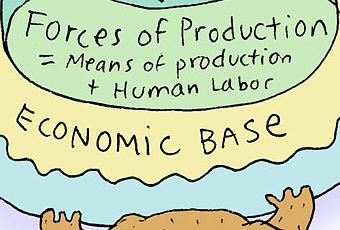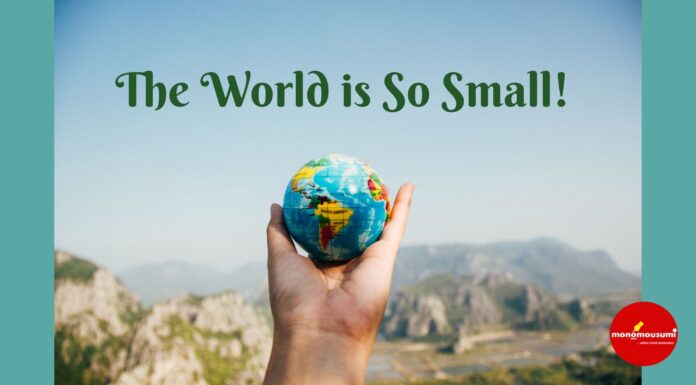Karl Marx said that the relation of people to the means of production determines the social relations. In other words, class can be called the building blocks of society. The interests of people are usually aligned with other people from their own class. Moreover, at all times a government is forced to side with the class interests of a given class. And the class system embodies the distinction that exists between income and wealth of people. This is called inequality. Inequality is also closely linked with poverty.
The general theory of poverty is that inflation causes it. Inflation exists because of inequality. If there were a nearly perfect equality of wealth prices of everything would be far fair. Moreover, such a situation could only arise if exploitation of man-by-man is abolished. And then poverty would also be abolished. Few people own gigantic sums of money while large number of people has little money. Socialization of capital and production, in a sufficiently advanced society, like ours, should mean the abolition of poverty. But is it possible?
It is generally said in the materialist, leftist circles that the reason for poverty is the existence of capitalism. Capitalism is a system of economy (or political economy, as Marx would say) based on private ownership of the means of production and their operation for the profit of the owners. A few characteristics of this system are capital accumulation, wage labour and free market, based on the principle of voluntary exchange. Capital accumulation, the accumulation of money, is the principle motive for economic life and production in the society.
This means that production is specifically geared for the market, and for customers. The welfare of people is rarely the motive of the capitalist. Obviously, pure capitalism does not happen in most countries. It is so, because there are varying degrees of public ownership of economy nonetheless. However, with the expansion of globalization, under the pressure of the World Bank, many countries have been taking the path of liberalization or state retreat from the economic field. Obviously, there is the World Bank’s statistics claiming that poverty is declining globally. Why we are trusting someone, when they are apparently grading their own success, is anybody’s guess?
The World Bank has reduced the global poverty line several times. Moreover, the poverty line is too low. This invalidates their claim. Poverty has, in fact, increased in several countries by the movement towards right-wing economic policies. I have shown above the link of capitalism and poverty. However, there are reasons, why we cannot go ahead and declare ‘capitalism equals poverty’!
Poverty and inequality obviously existed before the rise of capitalism. In fact, a reason why free market did not create the utopia imagined by Libertarians aka ‘Ancapistan’ is that it launched from a society of inequality. It did not start from a starting point, in which people were equal. Only people with money can start ventures to accumulate more of it with a few exceptions. A person, who can’t buy food, would not be tempted to start a shop! Returning to the point, feudalism, the system that preceded it was a very povertarian system. It kept the majority of the population, the peasants at a hand-to-mouth situation. In Capitalism, there are more ways to become rich from a humble background than in feudalism. And vast majority of the land was concentrated in the hands of the feudal elite or the nobles. (I would like to call them the ‘ignobles’.) In contrast, the vast majority of disposable money or capital is concentrated in the hands of the capitalist elite, of capitalism.
Exploitative relations to production, is linked to class society and civilization. Before the existence of civilization, the division of labor could not have existed. Hence, people only produced as much as they needed. With the emergence of civilization, people have been selling their labour. Usually, labour is sold at prices lesser than its real value is. The great economist Karl Marx calls this ‘surplus value’. This surplus value, among other factors, helps determine the value of a commodity. Exploitation undoubtedly benefits the capitalist. And exploitation is an important factor that helps keep the working class and the peasants poor. The most hardworking people are usually the poorest.
Of course, the default defender of capitalism would declare that with hard work, anyone could become rich (Except the severely-exploited abject poor population). He would rattle with anecdotes of poor-turned-rich Jimmy Carter. Of course, there is no denying that there is a certain amount interchange of people between classes. However, does that really solve the problems of the vast mass of the working people? Yes, knights could be promoted to nobles under feudalism. That did not make the life of the poor people better.
Moreover, as it is pointed in the famous economics book Capital in the Twenty-First Century that , there has been a continuous general increase in inequality under capitalism. To such a stage that eight richest men on Earth own as much money as the poorer half of mankind. The period between 1928-1975 is an exception for reasons discussed in the book. That added with the fact that more and more rich people are inheriting wealth. We are going to get patrimonial capitalism, with hereditary capitalist elite.
Why don’t politicians act against the rise of an oligarchy? Because the capitalists already have an overwhelming preponderance of power, a clout. With their extensive money power, they can install and depose leaders. The capitalists’ interests dominate the foreign policies of several countries. When you only want power, why commit political suicide? The organizations of the working class do not often advance on a proper understanding of this crisis. We need the labor unions, across the world cooperate to pressurize the political class to act against the capitalist class. An international class struggle. A high income tax on capitalists, a fair minimum wage and strict enforcement of labour laws must be demanded.
We need to end inequality for a better and humane world.
Author : Aniruddha Aloke, 12 years from Palghar, A participant of International Essay Competition, August, 2018












[…] Aniruddha Aloke […]